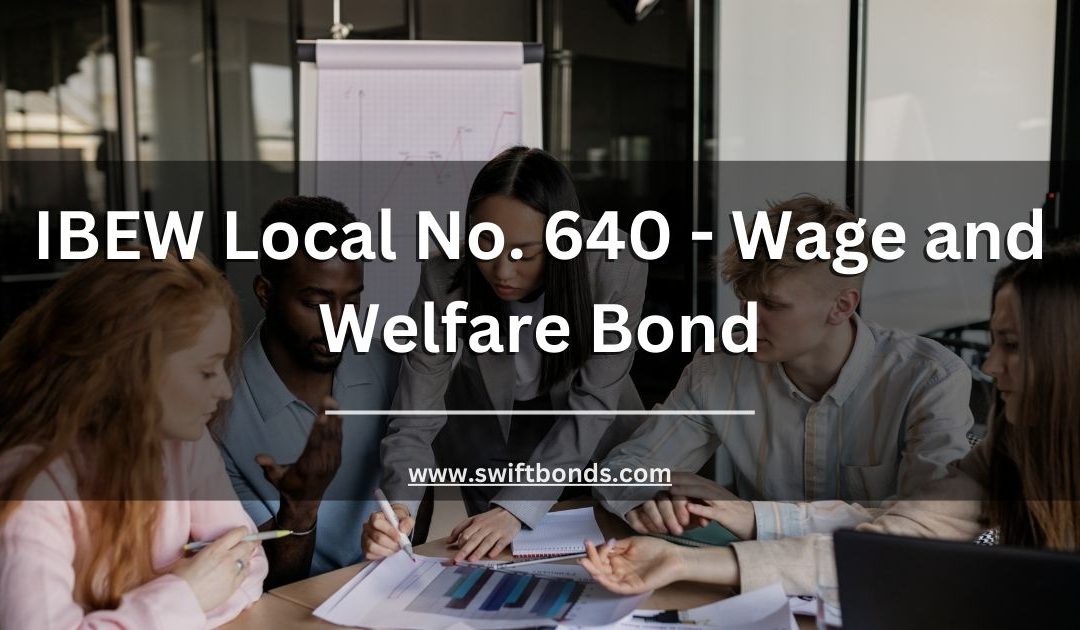Introduction
Unionized labor plays a key role in ensuring fair wages and benefits for employees across various industries in Arizona. For employers working with IBEW Local No. 640, the Wage and Welfare Bond acts as a financial safeguard, guaranteeing that workers receive their agreed-upon wages, benefits, and other compensation.
This bond is a requirement for contractors and businesses that engage in work covered by IBEW Local No. 640’s collective bargaining agreements. It demonstrates a commitment to fair labor practices while ensuring compliance with union regulations.
Common Misconceptions About the Wage and Welfare Bond
We’ve noticed that some businesses misunderstand the purpose of the IBEW Local No. 640 – Wage and Welfare Bond. This bond is not insurance but a financial guarantee that wages, fringe benefits, and union dues will be paid as required.
Some misconceptions include:
- The bond replaces payroll responsibilities – It does not. Employers must still make timely payments to workers.
- Only large contractors need this bond – Any business working under an IBEW Local No. 640 agreement must secure the bond.
- The bond covers worker injuries – It does not replace workers’ compensation insurance.
Misunderstanding these obligations can lead to compliance issues, financial penalties, and strained relationships with labor unions.
The Arizona – State Mining Inspector Surface Mine Reclamation Bond operates in a similar way for mining companies, ensuring that land restoration obligations are met after mining operations end. These bonds serve as financial guarantees, reinforcing accountability in different industries.

How the IBEW Local No. 640 – Wage and Welfare Bond Works
This bond provides financial assurance to IBEW Local No. 640, ensuring that wages, benefits, and deductions are properly managed. If a contractor fails to meet these obligations, the union can file a claim against the bond.
Key Features of the Bond:
- Protects union members – Ensures that wages and benefits are properly paid.
- Supports compliance with union contracts – Contractors must maintain an active bond to work under IBEW Local No. 640 agreements.
- Provides financial security for the union – The bond acts as a safety net, reducing financial risk.
Companies working in industries with financial obligations, such as utility providers, must meet similar bonding requirements. The Navopache Electric Cooperative – Utility Deposit Bond guarantees payment for electric services, much like the Wage and Welfare Bond guarantees employee compensation.

Steps to Obtain an IBEW Local No. 640 – Wage and Welfare Bond
1. Determine Bond Requirements
The required bond amount depends on the number of employees, wages, and other contractual obligations outlined by IBEW Local No. 640.
2. Apply for a Bond
A surety provider reviews financial history, credit standing, and business details to assess risk and determine the bond premium.
3. Receive a Quote
Bond pricing varies based on financial strength, past performance, and industry risk. Contractors with a solid financial track record often receive lower rates.
4. Purchase the Bond
After approval, the bond is issued and must be submitted to IBEW Local No. 640 as part of contract compliance.
5. Renew as Required
Wage and welfare bonds must be renewed regularly to maintain compliance with union agreements.
Following these steps ensures that contractors meet all bonding requirements while maintaining strong relationships with IBEW Local No. 640.

Risks of Operating Without a Wage and Welfare Bond
In our observation, failing to secure a Wage and Welfare Bond can lead to serious financial and legal consequences. These may include:
- Union contract violations – Working without a bond may lead to suspension from projects covered by IBEW Local No. 640.
- Legal action and penalties – Non-compliance can result in fines, lawsuits, and increased scrutiny.
- Financial risk – Without a bond, unions have fewer protections in the event of missed payments.
Similar financial risks exist for industries such as mining, where companies must secure the Arizona – State Mining Inspector Surface Mine Reclamation Bond to fulfill land restoration responsibilities.

Choosing the Right Surety Provider for the Wage and Welfare Bond
A reliable surety provider offers:
- Competitive rates – Pricing based on financial strength and industry experience.
- Fast approvals – Quick processing to meet contract deadlines.
- Expert guidance – Assistance in navigating union bond requirements.
- Ongoing support – Renewal reminders and compliance monitoring.
Working with a trusted surety provider simplifies the bonding process, allowing contractors to focus on their projects.
Conclusion
The IBEW Local No. 640 – Wage and Welfare Bond is an important financial tool that protects workers, ensures contract compliance, and supports fair labor practices.
Industries across Arizona require similar financial guarantees. The Arizona – State Mining Inspector Surface Mine Reclamation Bond ensures responsible mining operations, while the Navopache Electric Cooperative – Utility Deposit Bond secures payment commitments for utility services.
By securing the right bond, contractors demonstrate reliability, protect employees, and maintain good standing with IBEW Local No. 640.
Frequently Asked Questions
Who needs an IBEW Local No. 640 – Wage and Welfare Bond?
Any contractor or employer working under IBEW Local No. 640’s collective bargaining agreement must secure this bond.
How does this bond protect workers?
It ensures that wages, benefits, and union deductions are properly managed. If an employer fails to pay, the union can file a claim.
What factors influence bond cost?
Pricing is based on financial stability, credit history, and business risk. Contractors with strong financials typically receive lower rates.
Is this bond the same as workers’ compensation insurance?
No, workers’ compensation covers injuries, while the Wage and Welfare Bond guarantees financial obligations to employees.
How often does the bond need to be renewed?
Renewal requirements depend on union agreements, but bonds typically need to be renewed annually.
What happens if an employer fails to pay wages or benefits?
The union may file a claim against the bond, and the surety will cover valid claims up to the bond amount. The employer is responsible for repaying the surety.


